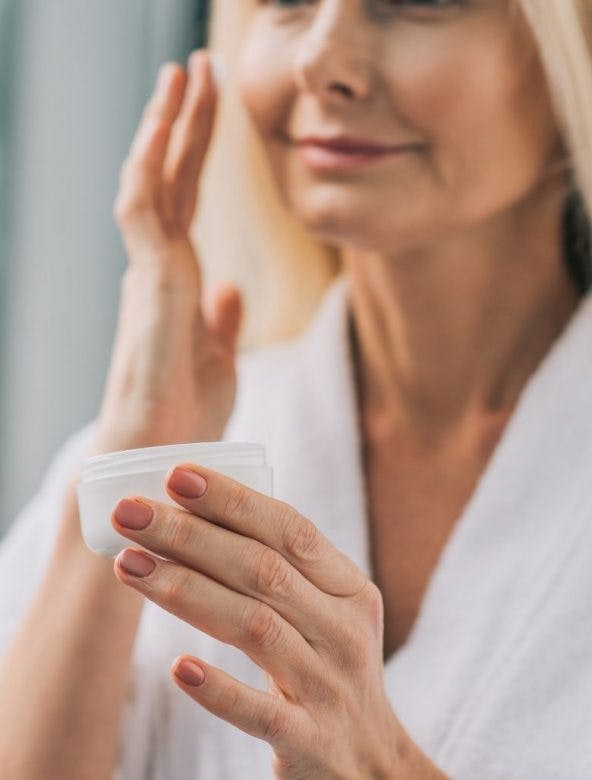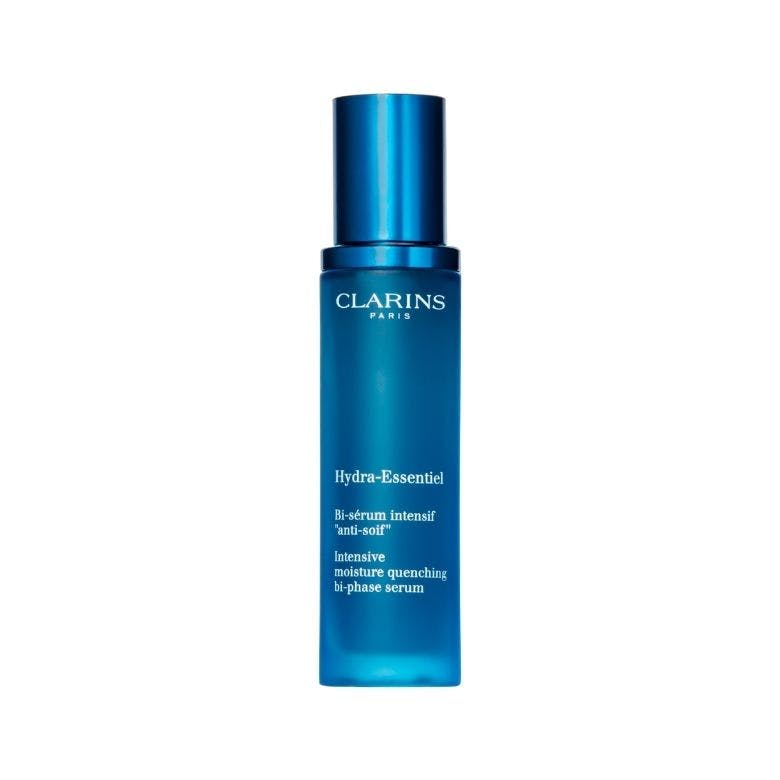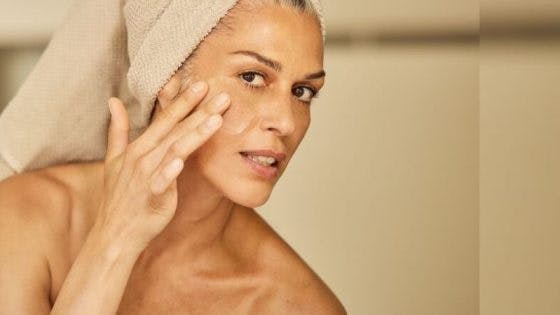Anti-Ageing Skin Care Ingredients: The Actives To Invest In Now
7 minutes read
The most effective anti-ageing skincare uses ‘actives’ that can help slow down the ageing process. The high-tech versions also go one step further, they are specifically formulated to release the active ingredients gradually, so there is a minimal reaction but utmost efficacy.
If you’re new to actives, on occasion, they may initially cause a few side effects, such as sensitivity, tingling, even redness. But these are only temporary, and it’s worth soldiering on to reap the benefits of these highly effective pro-agers. Stop using for a few days – and then reintroduce again.
Does anti-ageing skincare work?
We are all aware of the importance of anti-ageing skincare products to protect the skin against harsh environmental effects such as pollution and the sun.
And yes, daily skincare certainly helps regenerate the skin, hydrate it, keep it smooth and more elastic. But as we age, we need a lot more assistance, an arsenal of the best anti-ageing ingredients in our skincare products that work towards keeping the signs of wear at bay, minimising wrinkles and sunspots – making the skin look younger and smoother.
According to research by the National Library of Medicine, while ageing is genetically determined – a decent skincare regimen can also help slow it down. Anti-ageing to prevent the ravages of time is to us: ‘healthy ageing’ or ‘pro-ageing’ at Beauty Daily.

What ingredients help with anti-ageing?
Here is a list of 11 of the best anti-ageing skincare ingredients that have been scientifically chosen because of their effectiveness:
Succinic Acid
Move over glycolic – the new ‘succinic acid’ is known for improving acne-prone skin, and it’s also being recognised for its brilliant anti-ageing benefits.
Found in fermented amber, sugar cane and apple cider vinegar, it has antioxidant, antibacterial and antimicrobial properties. Succinic acid may also inhibit collagen breakdown in the skin – which is exactly what you want from a pro-age perspective.
Cica
Thanks to the love of all things ‘K-beauty’, this botanical herb is fast becoming a must-have ingredient in skincare. Extracts of cica have been used in Chinese medicine for thousands of years because of their skin-healing properties.
However, cica does more than just moisturise and heal; it’s become a popular ingredient in anti-ageing products, as it’s high in antioxidants that neutralise free radicals found in pollution and sun rays.
Free radicals cause damage to the skin’s barrier, resulting in uneven skin tone and other concerns linked to skin ageing. Cica improves the body’s blood circulation and collagen production, making the skin appear more youthful.
Harungana
The leaf of the Harungana plant, nicknamed the ‘Elixir of Youth’ is found on the Indian Ocean island of Madagascar just off the coast of East Africa. Local communities have always used its excellent therapeutic benefits (it’s known to improve liver function and has antiseptic and healing properties).
The actual ‘elixir’ is found in the orange/red sap of the plant, which is extracted for use in anti-ageing skincare products to help restore youthful vitality to the skin, soothe irritation and make it appear firmer.
Kangaroo flower extract
For centuries, Australians have harnessed the Kangaroo Paw plant as a healing ingredient in traditional recipes. The scientists are now following suit. It’s the wonder ingredient that helps cells heal, boosts collagen, and firms – meaning younger, lifted skin.
Hyaluronic acid
Hyaluronic Acid can hold up to 1,000 times its weight in water and keeps your face looking plump and dewy.
It serves as a thirst quencher for dehydrated skin, softening fine lines and giving a juicy radiance. There are high-tech formulations that also help boost the skin’s hyaluronic acid production too – so it intensively soothes irritated and dull skin – even sensitive types – flooding the skin with hydration.

Peptides
Peptides in skincare are designed to boost amino acids and, in turn, collagen for firmer-looking skin. They were accidentally discovered in the ’80s when scientists searching for wound-healing formulations stumbled upon these little amino acids that give skin structure and resilience.
Unfortunately, collagen depletes as you start to age. So, anyone over the age of 30 will benefit from including peptides in their anti-ageing skincare regimen as these help cells communicate the need to build more collagen, thus leaving you with a firmer epidermis.
Probiotics
The world has been abuzz about probiotics, prebiotics and all things microbiome. Why? According to the British Association of Dermatologists: “The skin is home to millions of bacteria, fungi and viruses that compose the skin microbiota. Similar to those in our gut, skin, microorganisms have essential roles and the protection against invading pathogens.”
In a nutshell, this whole community of organisms that live on the skin is key to how the skin behaves, reacts and general health of the epidermis.
The best advice? Protect your microbiome from the inside by eating plenty of fermented foods; Kefir, kimchi, and anything rich in polyphenols such as nuts, seeds, olive oil, and brassicas are good sources.
Also, ditch the over washing and scrubbing, as some surfactants and soaps might well be stripping your skin of natural oils – and the good bacteria that comes with it. Instead, opt for gentle cleansers that preserve the skin’s microbiota.
Horse chestnut
An extract of the seeds of the Horse Chestnut tree, this ingredient contains the anti-inflammatory compound, ‘aescin’, a powerful antioxidant and an enzyme that protects hyaluronic acid found in the skin. These substances soften the skin, stabilise collagen and elastin and reduce water retention.
Horse Chestnut extract has recently been added to several anti-ageing skincare treatments as a pro-ageing ingredient to boost circulation and help skin function well.
Niacinamide
Well-known for its soothing and healing effects on the skin, Niacinamide is water-soluble Vitamin B3; it lightens dark skin areas and decreases wrinkles by increasing the production of collagen.
It’s also an anti-inflammatory, so it helps control acne, sensitivity and redness and decreases pore size. This substance is used in skincare products to create a smoother, more even complexion and texture even for sensitive skincare types and has good compatibility when used alongside vitamin C, retinol, peptides, hyaluronic acid and AHAs.
Collagen
These days, everybody uses collagen in one form or another, whether in skincare products or consumed in a smoothie or powder. This essential ingredient gives the skin a more youthful, glowing appearance.
Collagen is not only the building block of the skin – but also plays a vital role in the health of your hair, bones and nails.
You see, as we age, our bodies stop producing enough collagen; without it, elasticity goes, and even though we can’t stop this completely, a decent collagen product will slow down the depletion process. Also, look out for ‘hydrolysed collagen formulas’ when shopping for collagen supplements, as these can be absorbed in our digestive system.
SPF
SPF is the most active ingredient you can include in the best anti-ageing skincare regimen. “Sun is the biggest aggressor to your skin – both for health and ageing concerns,” says Charlotte McHale, Clarins Training Manager.
According to CNN Health, there’s proof that sunscreen reduces skin ageing. People who use broad-spectrum sunscreen in their moisturiser, £34 everyday experience 24% less skin ageing than those who only use sunscreen periodically.
The study also showed that people in their 40s and 50s who started using sunscreen daily did see reduced signs of skin ageing. So, invest in a product that shields UV and blue light, along with indoor and atmospheric pollution for the ultimate in protection.
We already know sunscreen’s effects on sunburn and skin cancer, but now there’s another reason to slather on plenty of SPF every day.
McHale advises: “Apply liberally! Use at least double the amount of moisturiser you would normally use for your face and don’t forget ears and decolletage!”
Tips for choosing anti-ageing products
When you visit a dermatologist or skin expert – the first question they ask: ‘what are your concerns’?
As soon as you acknowledge what you want to achieve, then your skincare will help you get to your goals. If it’s radiance and tackling sunspots – then you would look for a vitamin C, for fine lines – maybe a retinol or retinol alternative – the gold-standard skincare ingredient that helps address skin texture, dullness, fine lines, acne and increases cell turnover.
The best skincare products are also the ones you use daily, so talk to your skin advisor about your regimen and how it can be improved everyday.
Maximise your results
Choosing skincare that contains active and proven anti-ageing ingredients will take you a step closer to younger-looking skin. Talk to a skincare specialist on how to layer your skincare for the most effective results. After all, who doesn’t want to age gracefully?
Sign up for our newsletter
We will keep you in the loop for special offers, exclusive gifts and product news.

